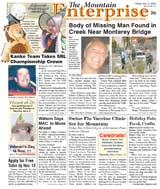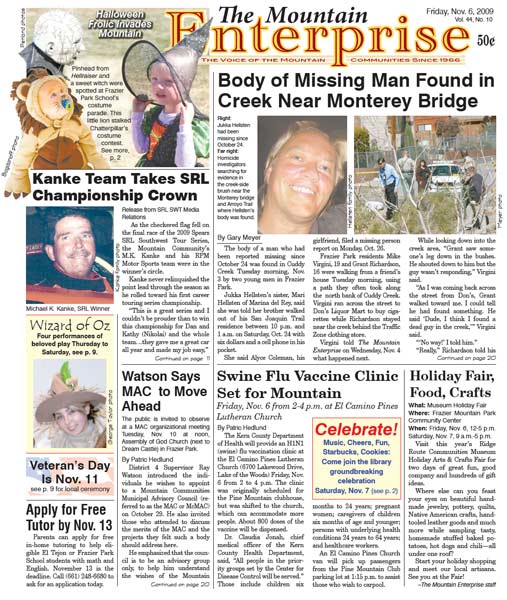FRAZIER PARK (Thursday, Nov. 12, 2009, 2:30 p.m.)—This is an unedited press release received this afternoon from the Center for Biological Diversity. The actual Writ of Mandate in its entirety, filed November 12, 2009 in Kern County Superior Court in Bakersfield is available for viewing by clicking here.
New Groups Join Fight to Save Tejon Ranch
Suit Filed to Stop Luxury Sprawl Megadevelopment
BAKERSFIELD, Calif.— A coalition of endangered species advocates, Native Americans, environmental justice advocates, and local residents filed suit today to overturn Kern County’s approval of the controversial Tejon Mountain Village resort development on Tejon Ranch, California. The growing opposition is drawn together by concern for the California condor, the sacred sites of the Chumash people, air quality degredation, and decreased quality of life for current residents if the sprawl complex is built.
The development of luxury homes, golf courses, and hotels would destroy critical habitat of the iconic and severely endangered California condor and would potentially derail the most expensive species-recovery effort ever attempted. The project would add significant air pollutants and greenhouse gases to an area that already suffers from the worst air pollution in the country. It would rely entirely on water unsustainably imported from the State Water Project, and is sited on top of two of the largest earthquake faults in the country – as well as in an area known for catastrophic and deadly wildfires.
The suit was filed under the California Environmental Quality Act in Kern County Superior Court in Bakersfield by the Center for Biological Diversity, Wishtoyo Foundation, TriCounty Watchdogs, and the Center on Race, Poverty, & the Environment. Final environmental-review documents were approved by the Kern County Board of Supervisors on October 5, 2009.
“All of California will suffer if this project gets built – more water will be stolen, the bird that graces our quarter will be doomed, our air will get dirtier, and thousands of people will be placed in harm’s way because of earthquakes and wildfires that will inevitably follow – all so Wall Street can make another quick buck,” said Adam Keats, director of the Urban Wildlands Program at the Center for Biological Diversity.
Tejon Ranch Company is heavily invested in by Third Avenue Real Estate Investments (TAREX), a firm that specializes in speculative real estate in environmentally sensitive areas (TAREX is a primary owner of St. Joe in Florida, another hotly contested and destructive development project).
Tejon Ranch, including the area Tejon Mountain Village is planned for, was historically occupied by three different Native American tribes whose land was stolen by the original owner of Tejon Ranch. The condor is one of the most important spiritual symbols to the region’s Native Americans.
“Tejon Mountain Village threatens Chumash village sites and sacred places, which is devastating to Chumash people,” said Mati Waiya, Chumash ceremonial elder and executive director of the Wishtoyo Foundation and its Ventura Coastkeeper Program. “It also threatens our sacred and cultural relationship with the California condor that is depicted in our ancient cave paintings and told in our stories, which have been passed down from generation to generation for more than 10,000 years. It is important that we as Chumash people protect our sacred grounds and our ancestors’ burial sites, and continue our elders’ work from the early ’80s to help bring back the California condor population, from 22 left in the wild to a still-scarce population of more than 140. The cultural impact of this proposed development and the accompanying proposed desecration of Chumash cultural resources and our sacred California condor is, once again, a demonstration of greed and disregard for Native American people and cultures.”
The project, located in the rugged Tehachapi Mountains along the “Grapevine” pass of Interstate 5, would add tremendously to the already overburdened highway – the only road off the mountain in either direction.
“This highway is already maxed out with thousands of cars and trucks – it can’t handle a project of this scale, which would more than double the population of the area,” said Jan de Leeuw of the TriCounty Watchdogs, a local citizen group based in nearby Frazier Park. “If this project goes forward, we’re looking at a traffic nightmare getting even worse, with sprawl development filling in everything from Los Angeles to Bakersfield.”
“Tejon Mountain Village straddles the two worst-performing air districts in the country,” said Brent Newell of the Center on Race, Poverty & the Environment. “Thousands of car trips going in and out of this resort – which we all know will include daily commuters, given its proximity to Los Angeles – will further dirty the air and increase pollution-related health problems of the people who live here.”
Preserving Tejon Ranch as a new national or state park would protect a bounty of native plant and animal communities, cultural and historic features, and scenic vistas. See http://www.savetejonranch.org.
This is part of the November 06, 2009 online edition of The Mountain Enterprise.
Have an opinion on this matter? We'd like to hear from you.


